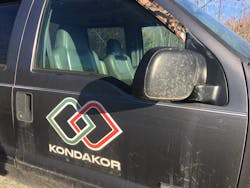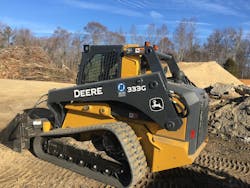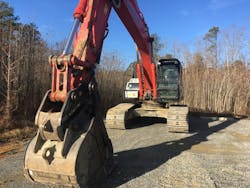Kristin Kondakor is only 26 but she’s wise beyond her years.
The owner/operations manager of the earthwork, land-clearing, and demolition contractor Kondakor, Inc., in Manquin, Va., places a high value on research and preparation—it’s how she started and how she now runs her business.
After Elek Kondakor, her now husband (and a former Under 40 in Construction Equipment Award winner), who had worked for a large commercial sitework company decided to go out on his own, he asked Kristin to be his business partner. When it came time to incorporate Kondakor in 2013, the new venture started with her as the owner.
So Kristin Kondakor had to complete a transition from having an associate degree in education, managing daycare facilities, and working as a paralegal, to being a construction business owner. Cue the research and preparation.
“There was a lot that went into it for me to learn the industry,” Kondakor says. “I pretty much had to teach myself how to read plans and figure out how to estimate. But I love it. I can’t really picture myself doing anything else.”
In less than five years, Kondakor, Inc., has grown from three employees and one 1994 Hitachi excavator to 15 people, a $2 million fleet comprised of Link-Belt excavators, wheel loaders, rollers, assorted trailers, six pickups, a CTL, and a Komatsu D51 Intelligent Machine Control dozer. It’s about to add two dump trucks and a couple of pickups. The company is also on the hunt for technicians, additional crews, and eventually two of its own service trucks.
But back to the dozer—and the research.
“I put a lot of research into it and had a lot of conversations with the dealer about the dozer we use,” Kondakor says. “I was very much against it. I had to be convinced that it was going to benefit us. It’s more expensive, there’s a lot of difference between ‘unintelligent’ and ‘intelligent’: $75,000 to $100,000 and then some.
“Then you have to buy the GPS equipment to go with it,” Kondakor says. “I had to have [the dealer] bring the dozer out and I had to watch them grade a building pad.”
Kondakor points out that with a conventional dozer on a project, the company would have to wait several days for a paid surveyor to come out to do the staking, and then an operator would have to grade by eye, hoping that it’s right, as a worker wields a grade rod to check accuracy everywhere the dozer goes.
“That can take up to a week to complete for something like a small retail project, but with this intelligent machine, we can have that on grade within a day,” she says. “Probably a half a day.”
Kondakor watched the dealer grade the pad and noted the differences. “With this machine, all we do is make a model, which somewhat compensates for the cost of the surveyor to stake it, and it literally uploads it to the machine and to our hand rover that signals the satellite, and we’re just in there with an operator. The blade does exactly what it needs to do.
“Where that initial cost was different and higher on the intelligent machine, it made up in other aspects as far as speed and production on the job,” Kondakor says. “It was my final signal to go that route.
“Once our lease is up in July, we’re looking to lease two more because we’re that busy,” she adds. “We’re also looking into getting GPS [machine control] excavators because we do some pipe work. If we don’t sub that work out, we will probably invest in that machine because it tells you where to dig; you’re digging on grade all the time.”
The emphasis on technology so early in the company’s development is no accident. “We have tried to be one step ahead at all times,” Kondakor says. Her fleet-management style is well thought out.
Kondakor leases most of its equipment, with the exception of its excavators. Wear on the equipment is a big driver on the lease decision.
“We mainly look at wear on the machine,” Kondakor says. “Anything that’s leased, we have the option to turn it back in two or three years, or buy it. The CTL, we just started the lease on, that is something that is used day in and day out, and it will get run down. We made the decision that’s not a machine we want to own.
“I think the reason we’re different from other companies—because you see some companies have older equipment—is that we find that if we run older equipment, we have a lot of downtime in repairs,” Kondakor says. “We were losing money on that aspect; there are the parts, and then we were having to pay someone to fix it, or take our own time to fix it if we could. So we’ve refreshed our equipment for less downtime. We put the CTL on a lease, and we’ll replace it every three years, every 1,500 hours.”
Kondakor buys excavators because she likes to spec them out “just the way they like them,” she says. “We’ve tweaked them, the Link-Belt 300 has a forestry package with guarding, and there are four different buckets for each machine. We do keep track of all the maintenance costs; we’ll continue to purchase them and keep them until it costs us more to repair the machine than operate it.”
She’s also done her homework on telematics, particularly as it relates to the fleet’s idling.
“With the machine’s telematics, I can log on and see if a machine’s on, if it’s pushing dirt, how much dirt it’s pushed,” Kondakor says. “It has benefitted us a lot. We saw that a crew was leaving machines on and letting them run all day. If it’s cold, they didn’t want to get into a cold machine. Our idle time was really high; well, that’s doing nothing but burning our fuel.”
Kondakor addressed the situation with her crews and has cut idling down by a whopping 70 percent. “Tracking is not only helping our fuel situation, but it’s also helping our resale value in the end with a machine, in terms of fewer hours.”
Kondakor estimates that in a recent four-month period, the company has saved $5,000 to $10,000 in fuel alone.
“We have Fleetmatics GPS on all of our pickups, that’s also something we watch,” Kondakor says. “If it was cold, or it’s hot and they didn’t want to get into a hot truck, their idle times were ridiculous. We’ve really had to crack down on it. We pull reports every week, and pull a monthly report, and we let them know that maybe they’ve a had a couple of harsh driving records, or asked them why they idled a truck for two hours today.”
The Fleetmatics devices also show Kondakor where trucks are parked, with a 360-degree view of the area, the vehicle’s movements, and allow the setting of a geogrid. “We also realize that the trucks were getting a lot of mileage put on them. The computer in the trucks will log the hours on it, which will also void a warranty if it’s over the hour capacity,” she says.
Kondakor keeps an eagle eye on hours and costs.
“That’s how we implement all of our bidding,” she says. “We might not know everything right on the money, but I would say we’re 90 percent accurate. This is what the machine costs us, this is what the operator costs to run the machine, plus fuel, plus payroll tax and all that kind of stuff, how long it will take to do it, our percentage, and boom, there’s your number. We’ve actually known those costs since Day 1.
“I love the estimating, I would say that’s my favorite part of the job. It’s something different every day.”
Kondakor also has taken to the equipment aspect. “Equipment is a piece of cake. Just last night I was out with my husband changing the fuel filter on the Link-Belt,” she says. “I like to know what needs to be done in maintenance and on the job site, so I know exactly what has to go on.” She has come a long way from her education and legal roots.
“Just don’t give up. There have been several times where I said to myself ‘I don’t want to do this, this is too stressful, this is too much.’ But I always sit back and look at the big picture. Yes, something [negative] may have happened today, but look where you’re at. I tell myself, ‘Don’t give up on what you want.’ Keep going, and if you fail, get up and try again.”
Kondakor hopes to take the company from working seven jobs at once to having 10 or 15 going, and from one office to multiple offices in Virginia, as well as expanding its work area outside Virginia into North Carolina and South Carolina. She’ll prepare, and she’ll research.
Don’t bet against her.







